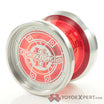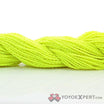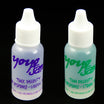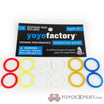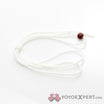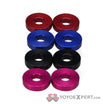Originally posted elsewhere, reposted here in an effort to aid those with bearing troubles.
I’m not entirely sure why the myth of cleanness being bad for bearings continues to be so prevalent. I suppose it could have started when a few guys didn’t clean everything out of their bearings (or used dirty solvents, maybe) and panicked when their bearings didn’t spin quite right until they put oil in to let the tiny bits of grit or whatever slide out of the way. Since they wanted to be helpful, they then spread the word: dry bearings lock up, so lube your bearings if you want to keep using them. Many other yoyoers heard this, took it as the gospel truth, and proceeded to spread it around…and so it continued for years and years afterward.
Contrary to the myth, locking and poor bearing performance is really due to the bearing not being clean enough. Under normal circumstances, when you clean your bearings, as long as they’re clean clean when you’re done, there shouldn’t be any problems whatsoever with locking up. If even a single bit of grit (or silicone, yikes!) gets in there wrong, it can make a noticeable difference in the bearing’s performance or even lock it. This can happen during cleaning or during normal use; the treatment is the same: clean it out, and do it right this time.
Also relevant to really getting bearings clean, I think, is the paper method I’ve been using on my bearings for years:
Deshield the bearing, then put it on a paintbrush handle or something that’ll hold it by the center. Inspect it for hairs or obvious grit and remove anything you can see carefully with an xacto knife or something of the sort. Cut out some small wedges of paper (with an angle of 20-30°) and fold them in half lengthwise to double the thickness. Firmly but very carefully insert one into the bearing between two of the balls, next to the outer race. Rotate the bearing several turns, then remove the paper. There’s probably some black gunk on the paper. Do it again with a clean piece. Also insert pieces next to the inner race to scrub that as well. Repeat this until you stop getting gunk on the paper. At this point your bearing should be bone dry and very clean. If you want, you can dip a wedge in oil and touch one of the races a few times to lube it up.
I also do this right after I clean my bearings with mineral spirits, before they dry. The paper directly absorbs the liquid and helps prevent residue from building up. As long as I’ve been doing this, I’ve never locked up a bearing. In fact, I’ve rescued several ‘dead’ bearings with this method as well.
